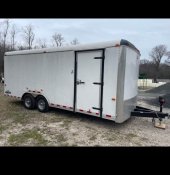Migh7yMous3
New Member
Hello everyone and thanks for being here on my first post.
Let me start off by saying that I don't have much electrical experience and don't plan to do any of the wiring hookups by myself. I plan to hire a professional for all the wiring and connecting everything, but what I'd like to do is purchase everything get it all set up and then just pay an electrician to wire everything so I don't have any fire issues or blowing anything.
With that said I'm trying to build my trailer to take my motorcycles to the race ttrack. The trailer is a 8.5x20. Most tracks that I go to are hot and sometimes humid.
I want to be able run my tire warmers (about 1300 watts), an ac (most likely a mini-split and guessing around1200-1800 watts), and possibly a small water pump/shower with tankless or small 6 gal water heater(unsure on power draw from this item so far).
I have a generator that can run all of this no problem. That being said no one wants to listen to a 7500 watt generator all day.
So my plan is to install 2 3000 watt inverters. One to power tire warmers and the hot water heater(won't run both at the same time) and the other inverter to handle the ac and lighting.
I was thinking of using the Lifepo4 server rack batteries(possibly 2-3) and adding some solar to the roof to maintain them. I'll have a "shore power" hookup to keep everything topped off since I may not have enough solar to maintain for a whole day or weekend at the track.
I'll keep my problem simple.
I don't know what components to buy or what voltage to go. 12v, 24v 48v?
Any advice on what I need? I appreciate any helpful feedback.
I've been a diesel mechanic my whole life but have little to no experience with electrical but this seems like a fun project to me and I'd love to give it a shot.
Thank you all for your help.
Let me start off by saying that I don't have much electrical experience and don't plan to do any of the wiring hookups by myself. I plan to hire a professional for all the wiring and connecting everything, but what I'd like to do is purchase everything get it all set up and then just pay an electrician to wire everything so I don't have any fire issues or blowing anything.
With that said I'm trying to build my trailer to take my motorcycles to the race ttrack. The trailer is a 8.5x20. Most tracks that I go to are hot and sometimes humid.
I want to be able run my tire warmers (about 1300 watts), an ac (most likely a mini-split and guessing around1200-1800 watts), and possibly a small water pump/shower with tankless or small 6 gal water heater(unsure on power draw from this item so far).
I have a generator that can run all of this no problem. That being said no one wants to listen to a 7500 watt generator all day.
So my plan is to install 2 3000 watt inverters. One to power tire warmers and the hot water heater(won't run both at the same time) and the other inverter to handle the ac and lighting.
I was thinking of using the Lifepo4 server rack batteries(possibly 2-3) and adding some solar to the roof to maintain them. I'll have a "shore power" hookup to keep everything topped off since I may not have enough solar to maintain for a whole day or weekend at the track.
I'll keep my problem simple.
I don't know what components to buy or what voltage to go. 12v, 24v 48v?
Any advice on what I need? I appreciate any helpful feedback.
I've been a diesel mechanic my whole life but have little to no experience with electrical but this seems like a fun project to me and I'd love to give it a shot.
Thank you all for your help.





